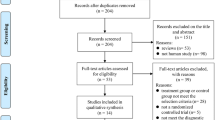Abstract
To assess the long-term use of l-dopa alone vs l-dopa-sparing therapy, as initial treatment, provides the most efficient long-term control of symptoms and best quality of life for people with early Parkinson’s disease (PD). PubMed; Google scholar; Cochrane Central Register of Controlled Trials and the Web of Science were searched for randomised, placebo-controlled trials (RCTs) on l-dopa alone and l-dopa sparing as initial treatment in early PD patients. We used a random effects model rather than a fixed effects model because of this takes into account heterogeneity between multi-studies. Eleven RCTs were included. The results showed that l-dopa alone could evidently improve the UPDRS part I (p = 0.005), part II (p < 0.0001), part III (p < 0.0001) and UPDRS total score (p = 0.004) compared with l-dopa-sparing therapy in PD patients. Meanwhile, a reduced risk of dyskinesia (p < 0.0001, RR = 1.88, 95 % CI 1. 37–2.59) and wearing-off phenomenon (p < 0.00001, RR = 1.36, 95 % CI 1. 20–1.55) in patients treated initially with l-dopa-sparing therapy compared to l-dopa has been consistently reported. What is more, we found more patients on al-dopa-sparing therapy were more than triple as likely to discontinue treatment prematurely due to adverse events than l-dopa treatment patients (43.7 vs 15.8 %). l-Dopa alone is the most effective medication available for treating the motor symptoms of PD patients, despite the greater incidence of involuntary movements. Meanwhile, more patients on dopamine agonists or MAOBI were more likely to discontinue treatment prematurely than l-dopa alone treatment patients within the long follow-up period.






Similar content being viewed by others
References
Marsh L, Dawson TM (2000) Treatment of early Parkinson’s disease. BMJ 321(7252):1–2
Brotchie J, Fitzer-Attas C (2009) Mechanisms compensating for dopamine loss in early Parkinson disease. Neurology 72(7 Suppl):S32–S38
Connolly BS, Lang AE (2014) Pharmacological treatment of Parkinson disease: a review. JAMA 311(16):1670–1683
Fahn S, Oakes D, Shoulson I et al (2004) Levodopa and the progression of Parkinson’s disease. N Engl J Med 351(24):2498–2508
Stowe RL, Ives NJ, Clarke C, et al. (2008) Dopamine agonist therapy in early Parkinson’s disease. Cochrane Database Syst Rev (2):CD006564. doi:10.1002/14651858.CD006564
Stern MB (2004) Dopamine agonists modify the course of Parkinson disease. Arch Neurol 61(12):1969–1971
Utsumi H, Okuma Y, Kano O et al (2013) Evaluation of the efficacy of pramipexole for treating levodopa-induced dyskinesia in patients with Parkinson’s disease. Intern Med 52(3):325–332
Lang AE, Marras C (2014) Initiating dopaminergic treatment in Parkinson’s disease. Lancet 384(9949):1164–1166
Rascol O, Brooks DJ, Korczyn AD et al (2000) A five-year study of the incidence of dyskinesia in patients with early Parkinson’s disease who were treated with ropinirole or levodopa. 056 Study Group. N Engl J Med 342(20):1484–1491
Pd Med Collaborative Group (2014) Long-term effectiveness of dopamine agonists and monoamine oxidase B inhibitors compared with levodopa as initial treatment for Parkinson’s disease (PD MED): a large, open-label, pragmatic randomised trial. Lancet 384(9949):1196–1205
Oertel WH, Wolters E, Sampaio C et al (2006) Pergolide vs levodopa monotherapy in early Parkinson’s disease patients: the PELMOPET study. Mov Disord 21(3):343–353
Vesterinen HM, Sena ES, Egan KJ et al (2014) Meta-analysis of data from animal studies: a practical guide. J Neurosci Methods 221:92–102
Rinne UK, Bracco F, Chouza C et al (1998) Early treatment of Parkinson’s disease with cabergoline delays the onset of motor complications. Results of a double-blind levodopa controlled trial. The PKDS009 Study Group. Drugs 55(Suppl 1):23–30
Parkinson Study Group (2000) Pramipexole vs levodopa as initial treatment for Parkinson disease: a randomized controlled trial. JAMA 284(15):1931–1938
Rascol O, Brooks DJ, Korczyn AD et al (2000) A five-year study of the incidence of dyskinesia in patients with early Parkinson’s disease who were treated with ropinirole or levodopa. 056 Study Group. N Engl J Med 342(20):1484–1491
Caraceni T, Musicco M (2001) Levodopa or dopamine agonists, or deprenyl as initial treatment for Parkinson’s disease. A randomized multicenter study. Parkinsonism Relat Disord 7(2):107–114
Parkinson Study Group (2002) Dopamine transporter brain imaging to assess the effects of pramipexole vs levodopa on Parkinson disease progression. JAMA 287(13):1653–1661
Holloway RG, Shoulson I, Fahn S et al (2004) Pramipexole vs levodopa as initial treatment for Parkinson disease: a 4-year randomized controlled trial. Arch Neurol 61(7):1044–1053
Hauser RA, Rascol O, Korczyn AD et al (2007) Ten-year follow-up of Parkinson’s disease patients randomized to initial therapy with ropinirole or levodopa. Mov Disord 22(16):2409–2417
Parkinson Study Group CALM Cohort Investigators (2009) Long-term effect of initiating pramipexole vs levodopa in early Parkinson disease. Arch Neurol 66(5):563–570
Utsumi H, Cabergoline as the Starting Treatment and its Long-term Effects (CASTLE) Study Group (2012) Long-term effects of cabergoline and levodopa in Japanese patients with early Parkinson’s disease: a 5-year prospective study. Acta Med Okayama 66(2):163–170
Storch A, Wolz M, Beuthien-Baumann B et al (2013) Effects of dopaminergic treatment on striatal dopamine turnover in de novo Parkinson disease. Neurology 80(19):1754–1761
Oguh O, Kwasny M, Carter J et al (2013) Caregiver strain in Parkinson’s disease: national Parkinson Foundation Quality Initiative study. Parkinsonism Relat Disord 19(11):975–979
Ferreira JJ, Katzenschlager R, Bloem BR et al (2013) Summary of the recommendations of the EFNS/MDS-ES review on therapeutic management of Parkinson’s disease. Eur J Neurol 20(1):5–15
Olanow CW, Schapira AH (2013) Therapeutic prospects for Parkinson disease. Ann Neurol 74(3):337–347
Katzenschlager R, Head J, Schrag A et al (2008) Fourteen-year final report of the randomized PDRG-UK trial comparing three initial treatments in PD. Neurology 71(7):474–480
Parashos SA, Luo S, Biglan KM et al (2014) Measuring disease progression in early Parkinson disease: the National Institutes of Health Exploratory Trials in Parkinson Disease (NET-PD) experience. JAMA Neurol 71(6):710–716
Acknowledgments
We gratefully acknowledge Dr. Jie Chen for his help in guiding and revising the manuscript. We also thank all the study participants. The author(s) received no financial support for the research, authorship, and/or publication of this article.
Conflict of interest
The authors declared that they have no conflict of interests.
Author information
Authors and Affiliations
Corresponding author
Additional information
C. Xie and Y.-Y. Zhang contributed equally to this work.
Rights and permissions
About this article
Cite this article
Xie, Cl., Zhang, YY., Wang, XD. et al. Levodopa alone compared with levodopa-sparing therapy as initial treatment for Parkinson’s disease: a meta-analysis. Neurol Sci 36, 1319–1329 (2015). https://doi.org/10.1007/s10072-015-2253-7
Received:
Accepted:
Published:
Issue Date:
DOI: https://doi.org/10.1007/s10072-015-2253-7




